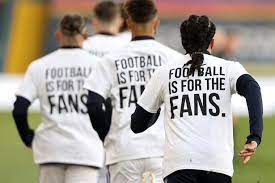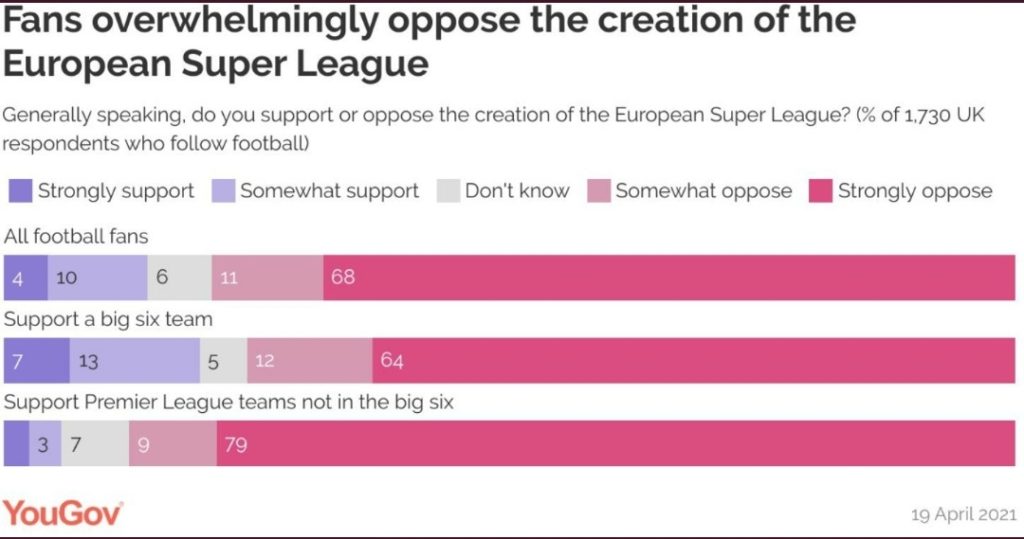By Samindra Kunti
April 20 – British PM Boris Johnson and his French counterpart Emmanuel Macron have led the political clamour against the breakaway Super League by promising their governments will support attempts to halt such a competition as the backlash against the 12 breakaway clubs reached a new crescendo.
Speaking on Monday Johnson said: “We are going to look at everything that we can do with the football authorities to make sure that this doesn’t go ahead in the way that it’s currently being proposed. I don’t think that it’s good news for fans, I don’t think it’s good news for football in this country.
“These clubs are not just great global brands – of course they’re great global brands – they’re also clubs that have originated historically from their towns, from their cities, from their local communities. They should have a link with those fans, and with the fanbase in their community. So it is very, very important that that continues to be the case.”
In a statement this morning, following meetings with the Premier League and fan groups, Johnson said that legislation to protect the leagues and clubs not in the Super League is a real option the government is prepared to take.
Johnson repeated his “unwavering support for the football authorities and confirmed they have the government’s full backing to take whatever action necessary to put a stop to these plans…that no action is off the table and the government is exploring every possibility, including legislative options, to ensure these proposals are stopped.”
Johnson has a panoply of options, ranging from tweaking the legal framework to action under competition law, at his disposal to reign in the Big Six English clubs, but any action would be fraught with complication with questions about what the British government can do to stop the plan for a breakaway football league.
Johnson was backed by his culture secretary Oliver Dowden, who said the proposal for a Super League was “tone deaf”.
“Football is in our national DNA,” Dowden told the House of Commons. “We invented it, we helped export it around the world and it’s been at the heart of British life for over a century.” He added: “We will not stand by and watch football be cravenly stripped of the things that made millions across the country love it.”
He said the government will launch a fan-led review of the sport. Dowden added: “Be in no doubt. If they can’t act, we will. We will put everything on the table to stop this from happening.”
A legal minefield aside, Dowden said ministers will consider governance reform in football as well as tweaks to competition law, higher taxes and stripping clubs of their coronavirus support funds.
Forget Brexit, there is a French accord after all
Across the Channel, Macron also opposed the creation of a European Super League. He said that France would support “all the steps” taken by football’s governing bodies to defend the existing competitions.
“The president of the republic welcomes the position of French clubs to refuse to participate to a European football Super League project that threatens the principle of solidarity and sporting merit,” said the French presidency in a statement sent to Reuters.
Germans call for bans
The German FA (DFB) has demanded that the Super League clubs should be banned.
“The clubs and their youth teams should be banned from all competitions until they think of their many supporters who have made them into top clubs in the world in the first place, and not only of their purses,” said DFB president Fritz Keller.
PSG, Bayern and Dortmund stay out the cabal
French champions Paris Saint-Germain have not signed up for the Super League, for which UEFA president Aleksander Ceferin explicitly thanked PSG president Nasser Al-Khelaifi at the confederation’s congress on Tuesday.
“Paris Saint-Germain holds the firm belief that football is a game for everyone. I have been consistent on this since the very beginning. As a football club, we are a family and a community; whose fabric is our fans – I believe we shouldn’t forget this,” said Al-Khelaifi.
German giants Bayern Munich and Borussia Dortmund have, for now, also rejected the new league and back the continental governing body.
The absence of the three clubs was notable, but German magazine Der Spiegel reported that the new executive of the Super League could act quickly to try to add the trio to the 15 founding clubs of the competition. However, both Bayern and Dortmund dismissed the reports.
“FC Bayern has not been involved in the plans for creating a Super League,” said Bayern CEO Karl-Heinz Rummenigge in a statement. “We are convinced that the current structure in football guarantees a reliable foundation. FC Bayern welcomes the reforms of the Champions League because we believe they are the right step to take for the development of European football. … . I do not believe the Super League will solve the financial problems of European clubs that have arisen due to the coronavirus pandemic. Rather, all clubs in Europe should work in solidarity to ensure that the cost structure, especially players’ salaries and agents’ fees, are brought in line with revenues, to make all of the European football more rational.”
Borussia Dortmund released a similar statement. “The board members of the European Club Association (ECA) came together for a virtual meeting on Sunday evening, where it was agreed that the board’s decision from last Friday still stands,” said Borussia Dortmund, CEO Hans-Joachim Watzke. “This decision dictates that all clubs wish to implement the proposed reforms to the UEFA Champions League. The ECA board members took a clear stance in rejecting plans for the establishment of a Super League.”
Klopp’s stars unaligned with Fenway’s money grab
Further down the football pyramid, coaches and players have also spoken out against the Super League. Ahead of his club’s 1-1 draw with Leeds United, Liverpool coach Jurgen Klopp said: “I don’t think it’s a great idea.
“I like the fact West Ham might play Champions League next year. No problem. I don’t want them to because we want to do that, but I like that they have that chance.”
After the game, midfielder James Milner commented: “I don’t like it and I don’t want it to happen.”
Fans say NO
A YouGov survey in the UK found that not even fans of the 12 breakaway clubs were in favour of the Super League but that an overwhelming majority strongly opposed the league’s creation.
EU defends European values
With all stakeholders in the game reacting to the proposal and the seismic implications, Europe also weighed in. EU Commission vice-president Margaritas Schinas condemned the Super League, but later seemed to indicate that the creation of Super League would be outside the remit of the EU to intervene.
He tweeted: “We must defend a values-driven European model of sport based on diversity and inclusion. There is no scope for reserving it for the few rich and powerful clubs who want to severe links with everything associations stand for: national leagues, promotion and relegation and support to grassroots amateur football. Universality, inclusion and diversity are key elements of European sport and of our European way of life.”
However in a comment to Italian newspaper Il Messaggero, Schinas said that the Super League is not the EU’s responsibility.
Sky support fan view
Football’s commercial stakeholders have so far been noticeable by their absence from the debate. Partner broadcast media have generally preferred to report it rather than comment on it, while sponsors have yet to give opinion.
The UK’s Sky Television, the biggest buyer of football rights in the UK did make a statement saying that it has “passionately articulated the views of fans” and “is completely focussed on supporting our long-term partners in the UK and Europe, already providing fans with the best live action from the best football leagues in the world, and we have not been involved in any discussion with the proposed breakaway European SuperLeague.”
Contact the writer of this story, Samindra Kunti, at moc.l1745255678labto1745255678ofdlr1745255678owedi1745255678sni@o1745255678fni1745255678. Additional reporting by Paul Nicholson.


